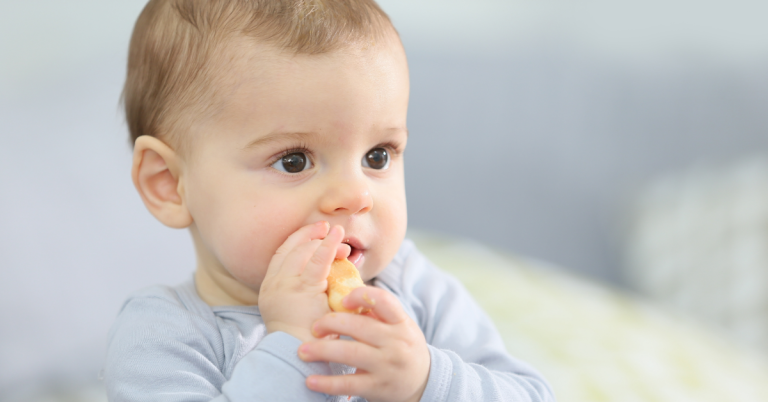What Can My 9-Month-Old Baby Do?
- May try to get a toy that is out of his reach.
- Can follow falling objects.
- Will start sitting without support.
- Will refuse to give away his toys.
- Can hold objects between thumb and fingers.
- May be able to clap his hands and wave goodbye.
- Is probably able to drink from a cup without assistance.
- May be able to pull himself up from a sitting position (between seven and twelve months) using a steady object to hold on to, like a couch or bed rails.
- May start cruising through the house while holding on to your furniture.
Nutrition at Nine Months
Developing good eating habits
Children are not born with an innate love for unhealthy foods and sweets. All children come into the world without knowing any flavours, and the tastes they love depend on the foods we introduce them to. Therefore, offering him healthy foods from the start is crucial.
- Avoid white flour. This may remind you of the general dieting advice you have heard before. Yet, this advice is not only important for losing weight, but it is, in fact, a necessity in any healthy diet. Instead, opt for whole-wheat, spelt, or rye bread or try some gluten-free bread occasionally.
- It is too early to introduce your baby to desserts. Try holding off giving your baby sweets for as long as possible. Don’t make the mistake of thinking that your baby will not eat cottage cheese or plain yoghurt without mixing it with banana. As your baby’s taste sensations are not accustomed to anything yet, they will learn to love these foods in their pure form. Don’t make fruit a must-have and give it as a snack or dessert after the main course.
- Avoid products with added sugars to prevent diseases like diabetes and obesity. It is easier not to introduce sugar at all than to have to restrict it later. Always read the labels on store-bought products well. Many come with (sometimes hidden) added sugars.
- Even babies with no teeth need to learn how to chew. If you haven’t done so, it is time to leave purees behind slowly and transition to self-feeding finger foods. Babies fed pureed foods for a long time become quite lazy in chewing, which may affect digestion and adequate nutrition in the future.
- Do not give your baby added salt. Babies do not need salt other than the salt naturally found in food. Do not add salt to the foods you prepare for your baby, and avoid giving foods with high salt content as this may cause unhealthy eating habits.
- Expose your baby to various foods, like vegetables and fruits, meat, fish and eggs, cheese, and dairy products. Don’t be surprised if your baby doesn’t want to eat a certain food that he is not used to. Try mixing it up with food your child already knows or offer it again after a few days. He will probably start appreciating it after some time. Always be careful about well-known allergens and avoid forbidden foods like milk and honey. To prevent choking hazards, always stay with your baby while eating, and avoid hard and round foods, like pieces of raw carrot, whole cherry tomatoes, whole grapes, unpitted olives, nuts, etc. You can reduce the risk by cutting and cooking the food.
- Talk about healthy nutrition and unhealthy foods. Even at a young age, your child will start to understand.
- Make exceptions. If you ban junk food and sweets altogether, your child may look at them as the forbidden fruit and start to crave them even more. Instead of strictly prohibiting these foods, offer them occasionally when your baby is old enough to understand the concept of exceptional moments, like a birthday party or an outing.
- Try to give your baby home-made food as much as possible. Store-bought products are often full of hidden sugars, salt and additives. Of course, life may be too hectic always to cook fresh meals for your little one. The selection of specially prepared baby foods can help you overcome those moments. Baby food is prepared under very strict hygienic circumstances and usually contains no or much less added sugar, additives, and salt.
- The above advice will probably fail if you do not implement it yourself. Babies largely learn by imitating, so setting a good example is essential. If your baby sees you eating cookies throughout the day, he will also want this. This may be the perfect time to work on a healthy diet for the whole family.
There is no need to feel guilty for not offering your baby sweets. Parents often think they are depriving their babies of something special when they avoid sweets. If you find yourself thinking this way, consider two things. First, your baby is not (yet) aware of what he is missing. Second, you are building an important foundation for keeping him healthy for the rest of his life. This is the best gift you can give him.
Measures at 9-Month-Old
| Gender | Weight (kg) | Length (cm) |
| Boy | 9 | 72 |
| Girl | 8.6 | 70 |
Play at 9-Month-Old

Your baby can start playing with big, soft blocks this month. He can explore the blocks and throw them. You can build towers for him, and he can break them down 😊 Another game that is entertaining and great for your little one’s language development is to ask, “Where is your nose?” “Where is your mouth?” “Where is your ear?” And then touch the body part while exclaiming in surprise, “Oh, here is your nose!” Playing peekaboo and exclaiming, “Where is my baby,” while shielding his eyes with your hand, is also great fun while helping your baby understand that you don’t cease to exist when he doesn’t see you (object permanence).
9-Month-Old Baby Health and Development Reviews
Your baby will have a Health and Development Review between nine and twelve months. During this check-up, you will talk, among other things, about your baby’s language development and learning abilities, safety, diet, and behaviour. You can also discuss any further worries or questions you may have.
It’s Your Turn Now – Write a Comment
How did you raise your 9-month-old baby? What challenges did you experience? How did you overcome them? We welcome your comments to support and inspire other caregivers.
Don’t Forget to Share!
Don’t forget to share our nine-month-old baby development article so other caregivers and expectant parents can read and learn!







